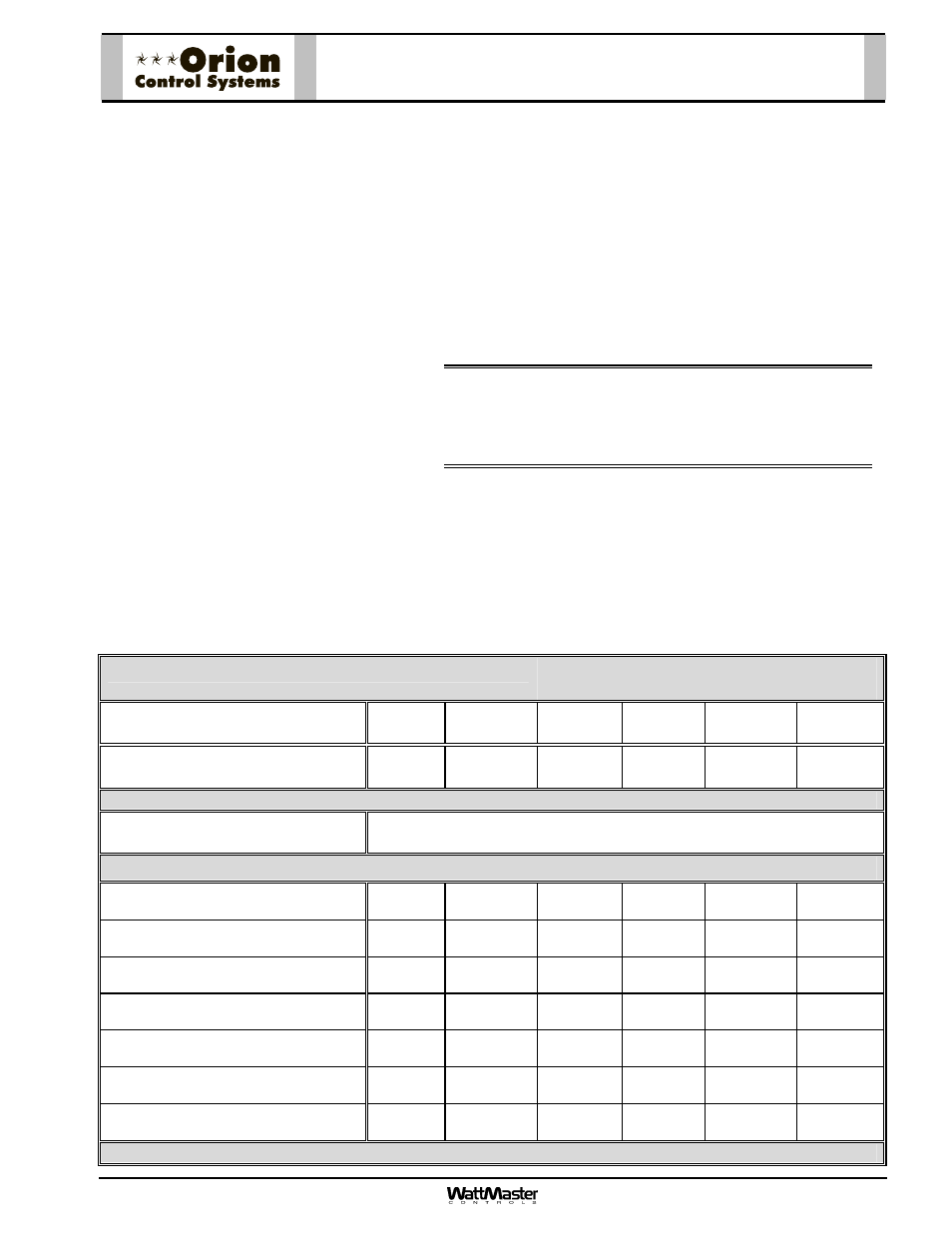Oe524-xx-pi round pressure independent zone damper, Round pressure independent zone damper sizing, Round zone damper selection data – Orion System OE742-XX-VAVZ User Manual
Page 23

Form: Orion-OE524-XX-PI-RndPIDmpr-Sub-01A
Page
2 of 2
With pressure independent systems it is possible to exceed this
rule by up to 50%. However it is advised that unless you are
experienced with VAV duct design the 2000 FPM rule should
be used. Using the maximum acceptable velocity for a branch
duct (typically 1000-1500 FPM for minimal noise), find the
smallest damper that will deliver the required CFM as deter-
mined by the load program.
Locate the branch velocity used in the duct design program in
the left hand column of the Round Zone Damper Selection Data
table. Move across the table and find the damper, which will
provide the acceptable CFM to meet the zone airflow require-
ments.
Note:
Compare the Round Zone Damper size selected
against the duct size to determine if the next size
up or down will provide acceptable performance
without requiring a transition fitting.
Pressure Independent Round Zone Dampers may not be
slaved together with Round Slaved Zone Damper Assemblies.
If more than one damper is required for a zone, all dampers
must be selected as pressure dependent. See the Round Pres-
sure Dependent Zone Damper submittal sheet and Round
Slaved Zone Damper submittal sheets for selection of mas-
ter/slave damper configurations.
OE524-XX-PI Round Pressure
Independent Zone Damper
Round Pressure Independent
Zone Damper Sizing
Use a load program to determine the peak load
for each zone. These calculations will be used
in selecting the appropriate zone damper sizes.
The Orion Systems utilize a typical low pres-
sure duct design. To reduce noise problems,
pressures should not exceed 1” W.C. in the
duct.
Primary trunk ducts used with Orion systems
should not be “undersized”. This is especially
true of “pressure dependent” systems. With
pressure independent systems this is not as
critical. With larger trunk ducts, it is easier to
assure relatively constant pressure to each
Round Zone Damper. Runs should be as short
as possible, and the trunk duct system kept as
symmetrical as possible to facilitate system
balancing. Wherever possible, run the trunk
ducts above corridors and locate the Round
Zone Dampers above corridors to reduce the
noise in the space and facilitate service of the
valves. Trunk ducts should be sized for no
more than 0.1” W.C. drop per 100 ft. of duct,
and a maximum duct velocity of 2000 FPM.
Round Zone Damper Selection Data
OE524-XX-PI Pressure Independent
Round Zone Damper
VAV/Zone Damper Round Duct Size
(Area Ft
2
)
6”
(0.196)
8”
(0.349)
10”
(0.545)
12”
(0.785)
14”
(1.069)
16”
(1.396)
CFM @ 1” Velocity Pressure
(Air Flow Probe “K” Factor)
448 904 1436
1891 3015 3839
Velocity Through VAV/Zone Damper
FPM
Airflow Through VAV/Zone Damper - CFM
(
P
S
inches W.C. w/ Air Damper Full Open)
500
98
(< 0.01)
175
(< 0.01)
273
(< 0.01)
393
(< 0.01)
535
(< 0.01)
698
(< 0.01)
750
147
(0.01)
262
(0.01)
409
(0.01)
589
(< 0.01)
802
(< 0.01)
1047
(< 0.01)
1000
196
(0.015)
349
(0.015)
545
(0.01)
785
(< 0.01)
1069
(< 0.01)
1396
(< 0.01)
1250
245
(0.025)
436
(0.02)
681
(0.015)
981
(0.015)
1336
(0.015)
1745
(0.015)
1500
294
(0.035)
523
(0.035)
818
(0.022)
1178
(0.020)
1604
0.020)
2094
(0.020)
1750
343
(0.045)
611
(0.035)
954
(0.034)
1374
(0.030)
1871
(0.030)
2443
(0.025)
2000
392
(0.065)
698
(0.043)
1090
(0.040)
1570
(0.040)
2138
(0.040)
2792
(0.030)
WattMaster reserves the right to change specifications without notice